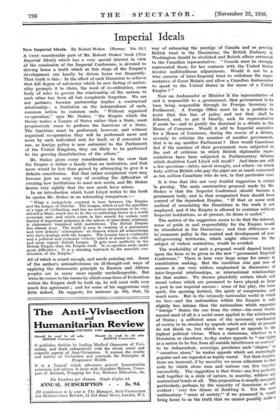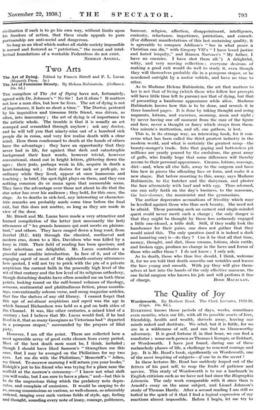Imperial Ideals
New Imperial Ideals. By Robert Stokes. (Murray. 10s. 6d.)
A VERY considerable part of Mr. Robert Stokes' book (Near Imperial Ideals) which has a very special interest in view Of the conclusion of the Imperial Conference, is devoted to driving home a truth which at this stage of the Empire's development can hardly be driven home too frequently. That truth is .this : In the effort of each Dominion to achieve that full. degree of autonomy which its new feeling of nation- ality proMpts it to -claim, the need of co-ordination, some body of rules to govern the relationship of the nations to each other has been all but completely forgotten. We are not partners, because partnership implies a contractual relationship ; a limitation on the independence of each, common action to common ends. " Without organized co-operation," says Mr. Stokes, " the Empire, which the theory makes a League of States rather than a State, must progressively cease to perform the functions of a State. The functions must .be performed, however,- and without organized co-operation they will be performed more and more by each individual unit for itself, or if entrusted to one, as foreign policy is now entrusted' to the Parliament of the United Kingdom, they are likely to be performed to the growing dissatisfaction of the others."
Mr. Stokes gives every consideration to the view that the Empire is rather a family than an institution, and that more would be lost than gained by attempting to give it a definite constitution. But that rather complacent view may become just `an easy -way of avoiding - the difficulties of creating new institutions to meet new needs, and Mr. Stokes insists very rightly that the new needs have arisen.
In an introduction which Lord Lloyd writes to the book he quotes Mr. Stokes in an interesting comparison :-
" What a melancholy contrast is here between the Empire and the League of Nations. The League, which is not the guardian of a type of civilization, and has no serious pretensions to be con- sidered a State, much less to be the co-ordinating factor in is world economic unit, and which exists in fact merely for certain very limited if important purposes in the sphere .of inter-State relations, is elaborately furnished with institutions. The British Empire has almost none. The result is seen in creation of a permanent and very definite ' atmosphere' at Geneva which all acknowledge who have dealings with the League. The League has a continuity and a political and economic vivacity which is denied to the older and more organic British League. It gets more publicity in the British Empire than the Empire itself. It co-operates more under great difficulties. It is a standing reproach to the anarchic con- stitution of the Empire."
All of which is sound enough, and needs pointing out. Some of the author's animadversions on ill-thought-out ways of applying the democratic principle to Eastern and African peoples are in many cases equally unchallengeable. But when he comes to the means by which some form of Federalism within the Empire shall be built up, he will meet with -very much less agreement ; and for some of his suggestions very little indeed. He suggests, for instance (p. 90), that, by way of enhancing the prestige of Canada and as proving British trust in the Dominions, the British Embassy in Washington should be abolished and British affairs entrusted to the Canadian representative. " Canada must be strongly represented there, for her contacts with the United States involve multitudinous adjustments. Would it not be a wise exercise of inter-Imperial trust to withdraw the repre- sentative of Great Britain and allOw a Canadian Ambassador to speak to the United States- in the name of, a United Empire ? "
Now an Ambeasador. or Minigter is the representative of and is responsible to a government, that government in its turn, being responsible through its Foreign Secretary to Parliament. A Foreign Office must be in a position to insist that. this line of Policy. and not that shall be followed, and, to put it bluntly, sack its representative if needs be—and to justify the dismissal in a debate in the Rouse of Commons.. Would it _add to Imperial amenities for a House of Commons, during the course of a debate, severely to criticize the nominee of another government, that is to say another Parlianient ? Row would Canadians feel if the nominee of their government were subjected to the sort of criticism to which British diplomatic repre- sentatives have been subjected in Parliamentary debates which doubtless Lord Lloyd will recall ? And there are still a few questions—debts, naval strength, and others—in which forty million British who pay the piper are as much concerned as ten million Canadians who do not, in that particular case.
It is true that this not very fruitful suggestion is rather in passing. The main constructive proposal made by Mr. Stokes is that the Imperial Conference ',should become a permanent body, and in that reorganized form should have control of the dependent Empire.. "If that or some such method of associating the Dominions in the work is not employed, and if the Empire is allowed to continue without Imperial institutions, as at present, its doom is sealed."
The motive of the suggestion seems to be that the interest, sense of pride in and responsibility for the Empire would be stimulated in the Dominions ; and that differences as to economic policy in the control and development of non. self-governing territories, which might otherwise be the subject of violent contention, would be avoided.
The workability of such a proposal would depend largely upon the form to be, given to -the new ".permanent Imperial Conference." There is here very -large scope for essays in constitution making. But the condition sine qua non of success is one very seldom emphasized in discussions of inter-Imperial relationships, or international relationships for that matter. We discuss plentifully certain ideals and moral values which are presumed to have played„-so large a part in our imperial success : sense of fair play, the team spirit, the sporting instinct, the spirit of compromise, and much more. But in the intensely nationalist world in which we live—and the nationalism within the Empire is only slightly less intense than the nationalism which separates "foreign " States the one from the other—the most funda- mental need of all is a social sense applied to the relationship of States ; a sufficient sense of the necessary mechanism of society to be shocked by appeals which not only at present do not shock us, but which we regard as appeals to the highest political virtue. When a statesman, whether in a Dominion or elsewhere, to-day makes appeals to " our rights as a nation to be free from all outside interference or control," to be independent, sovereign, proclaims such." slogans" as " ourselves alone," he makes appeals which are exceedingly popular and are regarded as highly moral. Yet their implica- tions are immoral, if by morality we mean adherence to that code by which alone men and • nations can live together successfully. The suggestion is that States can live-perfectly well together in a state of nature, in anarchy, without any contractual bonds at all. This proposition is. usually.accepted, particularly, perhaps, by the majority of Americans as self' evident ; very few dream of dhubting it. Yet the mod - rudimentary.'" sense of society;" if we- passes:led- it, would bring home to us the truth that we cannot possibly make s
civilization if each is to go his own way, without limits upon his freedom of action, that these crude appeals to pure partisanship are anti-social and dangerous. So long as an ideal which makes all stable society impossible is nursed and fostered as " patriotism," the moral and intel- lectual foundations of a workable Federalism do not exist.
NORMAN ANGELL.



















































































 Previous page
Previous page